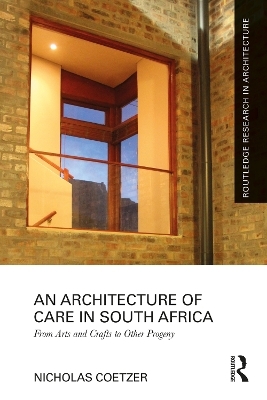
An Architecture of Care in South Africa
Routledge (Verlag)
978-1-032-51237-2 (ISBN)
- Noch nicht erschienen
- Versandkostenfrei
- Auch auf Rechnung
- Artikel merken
Architects care. It is foundational and germane to the discipline and practice of architecture. This book charts the way the Arts and Crafts Movement established the moral ethos of ‘an architecture of care’ that not only remains embedded in current discourse and practice but also that is being given a more vocal presence in our climate-crisis and social justice world.
By way of ‘genealogical strands’ the book charts the origin of ‘architecture of care’ ideas in the Arts and Crafts Movement and their impact on the ‘other progeny’ architectural projects in South Africa over the past hundred years. These range from the translation of inglenooks into an armature architecture of ‘Dignified Places’ in Cape Town’s townships to the ethos of ‘upliftment’ and care that translates from Octavia Hill through to ‘correcting’ building regulations and eventually finding a less moralising and more transformative impact in the ‘Hostels to Homes’ project.
The birth of design through context and climate in the Arts and Crafts Movement is demonstrated by the shift in South African houses from boxy cottages to solar- and nature-oriented ribbon plans as demonstrated through the work of Helmut Stauch and Norman Eaton. The dislocation of Arts and Crafts ideas to the Cape also demonstrated a limit to the valorising of vernacular architecture and its ‘against-globalization’ building materials whereby English architects promoted Cape Dutch settler architecture and denigrated African vernacular architecture. As a final ‘genealogical strand,’ the book demonstrates the coherence of moral instrumentality with the animism and affects potential of handmade buildings.
Written for academics, students and researchers interested in architectural history, it is an eye-opening investigation into the role of architecture in society.
Nicholas Coetzer is an Associate Professor and NRF-rated researcher at the University of Cape Town School of Architecture where he has worked since 2001. He is also the Director of the independent non-profit School of Explorative Architecture and a registered architect in South Africa. Nic completed his PhD at the Bartlett School of Architecture in 2004 which was published with Ashgate in 2013 as Building Apartheid: On Architecture and Order in Imperial Cape Town which solidified his interest in architecture at the turn of 19th century. Apart from many refereed journal publications and book chapters on contemporary and historical South African architecture and architectural pedagogy, Nic also contributed to a regular ‘back page’ column in Architecture South Africa.
Acknowledgments. Preface. Chapter 1.Buildings are for people: And other things. Chapter 2.Founders and founding tropes of an architecture of care. Chapter 3.Are you sitting comfortably? Inglenooks, armatures and over-anxious ‘Dignified Places’. Chapter 4.Uplifting work: The moral art of Octavia Hill, unsettling settlers, and ‘Hostels to Homes’. Chapter 5.Climate change: Arts and Crafts and context-based architecture in Southern Africa. Chapter 6.Mud and Soil: The political nature of building materials. Chapter 7.Handmade: From Cape Dutch animism and animated tools to a new ‘joy in labour’. Chapter 8. Concluding Remarks. Index.
| Erscheinungsdatum | 23.08.2024 |
|---|---|
| Reihe/Serie | Routledge Research in Architecture |
| Zusatzinfo | 49 Halftones, black and white; 49 Illustrations, black and white |
| Verlagsort | London |
| Sprache | englisch |
| Maße | 156 x 234 mm |
| Gewicht | 430 g |
| Themenwelt | Sozialwissenschaften ► Soziologie ► Spezielle Soziologien |
| Technik ► Architektur | |
| Wirtschaft ► Volkswirtschaftslehre | |
| ISBN-10 | 1-032-51237-7 / 1032512377 |
| ISBN-13 | 978-1-032-51237-2 / 9781032512372 |
| Zustand | Neuware |
| Informationen gemäß Produktsicherheitsverordnung (GPSR) | |
| Haben Sie eine Frage zum Produkt? |
aus dem Bereich


